- Home
- P. G. Wodehouse
The Swoop: How Clarence Saved England (Forgotten Books) Page 4
The Swoop: How Clarence Saved England (Forgotten Books) Read online
Page 4
Clarence chuckled grimly as the tape clicked out the news. The end had begun. To sow jealousy between the rival generals would have been easy. To sow it between two rival music-hall artistes would be among the world's softest jobs.
Among the general public, of course, the announcement created a profound sensation. Nothing else was talked about in train and omnibus. The papers had leaders on the subject. At first the popular impression was that the generals were going to do a comedy duo act of the Who-Was-It-I-Seen-You-Coming-Down-the-Street-With? type, and there was disappointment when it was found that the engagements were for different halls. Rumours sprang up. It was said that the Grand Duke had for years been an enthusiastic amateur sword-swallower, and had, indeed, come to England mainly for the purpose of getting bookings; that the Prince had a secure reputation in Potsdam as a singer of songs in the George Robey style; that both were expert trick-cyclists.
Then the truth came out. Neither had any specialities; they would simply appear and deliver lectures.
The feeling in the music-hall world was strong. The Variety Artists' Federation debated the advisability of another strike. The Water Rats, meeting in mystic secrecy in a Maiden Lane public-house, passed fifteen resolutions in an hour and a quarter. Sir Harry Lauder, interviewed by the Era, gave it as his opinion that both the Grand Duke and the Prince were gowks, who would do well to haud their blether. He himself proposed to go straight to America, where genuine artists were cheered in the streets and entertained at haggis dinners, and not forced to compete with amateur sumphs and gonuphs from other countries.
Clarence, brooding over the situation like a Providence, was glad to see that already the new move had weakened the invaders' power. The day after the announcement in the press of the approaching debut of the other generals, the leader of the army of Monaco had hurried to the agents to secure an engagement for himself. He held out the special inducement of card-tricks, at which he was highly skilled. The agents had received him coldly. Brown and Day had asked him to call again. Foster had sent out a message regretting that he was too busy to see him. At de Freece's he had been kept waiting in the ante-room for two hours in the midst of a bevy of Sparkling Comediennes of pronounced peroxidity and blue-chinned men in dusty bowler-hats, who told each other how they had gone with a bang at Oakham and John o'Groats, and had then gone away in despair.
On the following day, deeply offended, he had withdrawn his troops from the country.
The strength of the invaders was melting away little by little.
"How long?" murmured Clarence Chugwater, as he worked at the tape-machine. "How long?"
Chapter 4 - Clarence Hears Important News
*
It was Clarence's custom to leave the office of his newspaper at one o'clock each day, and lunch at a neighbouring Aerated Bread shop. He did this on the day following the first appearance of the two generals at their respective halls. He had brought an early edition of the paper with him, and in the intervals of dealing with his glass of milk and scone and butter, he read the report of the performances.
Both, it seemed, had met with flattering receptions, though they had appeared nervous. The Russian general especially, whose style, said the critic, was somewhat reminiscent of Mr. T. E. Dunville, had made himself a great favourite with the gallery. The report concluded by calling attention once more to the fact that the salaries paid to the two—eight hundred and seventy-five pounds a week each—established a record in music-hall history on this side of the Atlantic.
Clarence had just finished this when there came to his ear the faint note of a tarantula singing to its young.
He looked up. Opposite him, at the next table, was seated a youth of fifteen, of a slightly grubby aspect. He was eyeing Clarence closely.
Clarence took off his spectacles, polished them, and replaced them on his nose. As he did so, the thin gruffle of the tarantula sounded once more. Without changing his expression, Clarence cautiously uttered the deep snarl of a sand-eel surprised while bathing.
It was sufficient. The other rose to his feet, holding his right hand on a line with his shoulder, palm to the front, thumb resting on the nail of the little finger, and the other three fingers upright.
Clarence seized his hat by the brim at the back, and moved it swiftly twice up and down.
The other, hesitating no longer, came over to his table.
"Pip-pip!" he said, in an undertone.
"Toodleoo and God save the King!" whispered Clarence.
The mystic ceremony which always takes place when two Boy Scouts meet in public was complete.
"Private Biggs of the Eighteenth Tarantulas, sir," said the boy respectfully, for he had recognised Clarence.
Clarence inclined his head.
"You may sit, Private Biggs," he said graciously. "You have news to impart?"
"News, sir, that may be of vital importance."
"Say on."
Private Biggs, who had brought his sparkling limado and a bath-bun with him from the other table, took a sip of the former, and embarked upon his narrative.
"I am employed, sir," he said, "as a sort of junior clerk and office-boy by Mr. Solly Quhayne, the music-hall agent."
Clarence tapped his brow thoughtfully; then his face cleared.
"I remember. It was he who secured the engagements of the generals."
"The same, sir."
"Proceed."
The other resumed his story.
"It is my duty to sit in a sort of rabbit-hutch in the outer office, take the callers' names, and especially to see that they don't get through to Mr. Quhayne till he wishes to receive them. That is the most exacting part of my day's work. You wouldn't believe how full of the purest swank some of these pros. are. Tell you they've got an appointment as soon as look at you. Artful beggars!"
Clarence nodded sympathetically.
"This morning an Acrobat and Society Contortionist made such a fuss that in the end I had to take his card in to the private office. Mr. Quhayne was there talking to a gentleman whom I recognised as his brother, Mr. Colquhoun. They were engrossed in their conversation, and did not notice me for a moment. With no wish to play the eavesdropper, I could not help but overhear. They were talking about the generals. 'Yes, I know they're press-agented at eight seventy-five, dear boy,' I heard Mr. Quhayne say, 'but between you and me and the door-knob that isn't what they're getting. The German feller's drawing five hundred of the best, but I could only get four-fifty for the Russian. Can't say why. I should have thought, if anything, he'd be the bigger draw. Bit of a comic in his way!' And then he saw me. There was some slight unpleasantness. In fact, I've got the sack. After it was over I came away to try and find you. It seemed to me that the information might be of importance."
Clarence's eyes gleamed.
"You have done splendidly, Private—no, Corporal Biggs. Do not regret your lost position. The society shall find you work. This news you have brought is of the utmost—the most vital importance. Dash it!" he cried, unbending in his enthusiasm, "we've got 'em on the hop. If they aren't biting pieces out of each other in the next day or two, I'm jolly well mistaken."
He rose; then sat down again.
"Corporal—no, dash it, Sergeant Biggs—you must have something with me. This is an occasion. The news you have brought me may mean the salvation of England. What would you like?"
The other saluted joyfully.
"I think I'll have another sparkling limado, thanks, awfully," he said.
The beverage arrived. They raised their glasses.
"To England," said Clarence simply.
"To England," echoed his subordinate.
*
Clarence left the shop with swift strides, and hurried, deep in thought, to the offices of the Encore in Wellington Street.
"Yus?" said the office-boy interrogatively.
Clarence gave the Scout's Siquand, the pass-word. The boy's demeanour changed instantly. He saluted with the utmost respect.
"I wish t
o see the Editor," said Clarence.
A short speech, but one that meant salvation for the motherland.
Chapter 5 - Seeds of Discord
*
The days following Clarence's visit to the offices of the Encore were marked by a growing feeling of unrest, alike among invaded and invaders. The first novelty and excitement of the foreign occupation of the country was beginning to wear off, and in its place the sturdy independence so typical of the British character was reasserting itself. Deep down in his heart the genuine Englishman has a rugged distaste for seeing his country invaded by a foreign army. People were asking themselves by what right these aliens had overrun British soil. An ever-growing feeling of annoyance had begun to lay hold of the nation.
It is probable that the departure of Sir Harry Lauder first brought home to England what this invasion might mean. The great comedian, in his manifesto in the Times, had not minced his words. Plainly and crisply he had stated that he was leaving the country because the music-hall stage was given over to alien gowks. He was sorry for England. He liked England. But now, all he could say was, "God bless you." England shuddered, remembering that last time he had said, "God bless you till I come back."
Ominous mutterings began to make themselves heard.
Other causes contributed to swell the discontent. A regiment of Russians, out route-marching, had walked across the bowling-screen at Kennington Oval during the Surrey v. Lancashire match, causing Hayward to be bowled for a duck's-egg. A band of German sappers had dug a trench right across the turf at Queen's Club.
The mutterings increased.
Nor were the invaders satisfied and happy. The late English summer had set in with all its usual severity, and the Cossacks, reared in the kindlier climate of Siberia, were feeling it terribly. Colds were the rule rather than the exception in the Russian lines. The coughing of the Germans at Tottenham could be heard in Oxford Street.
The attitude of the British public, too, was getting on their nerves. They had been prepared for fierce resistance. They had pictured the invasion as a series of brisk battles—painful perhaps, but exciting. They had anticipated that when they had conquered the country they might meet with the Glare of Hatred as they patrolled the streets. The Supercilious Stare unnerved them. There is nothing so terrible to the highly-strung foreigner as the cold, contemptuous, patronising gaze of the Englishman. It gave the invaders a perpetual feeling of doing the wrong thing. They felt like men who had been found travelling in a first-class carriage with a third-class ticket. They became conscious of the size of their hands and feet. As they marched through the Metropolis they felt their ears growing hot and red. Beneath the chilly stare of the populace they experienced all the sensations of a man who has come to a strange dinner-party in a tweed suit when everybody else has dressed. They felt warm and prickly.
It was dull for them, too. London is never at its best in early September, even for the habitue. There was nothing to do. Most of the theatres were shut. The streets were damp and dirty. It was all very well for the generals, appearing every night in the glare and glitter of the footlights; but for the rank and file the occupation of London spelt pure boredom.
London was, in fact, a human powder-magazine. And it was Clarence Chugwater who with a firm hand applied the match that was to set it in a blaze.
Chapter 6 - The Bomb-Shell
*
Clarence had called at the offices of the Encore on a Friday. The paper's publishing day is Thursday. The Encore is the Times of the music-hall world. It casts its curses here, bestows its benedictions (sparely) there. The Encore criticising the latest action of the Variety Artists' Federation is the nearest modern approach to Jove hurling the thunderbolt. Its motto is, "Cry havoc, and let loose the performing dogs of war."
It so happened that on the Thursday following his momentous visit to Wellington Street, there was need of someone on the staff of Clarence's evening paper to go and obtain an interview from the Russian general. Mr. Hubert Wales had just published a novel so fruity in theme and treatment that it had been publicly denounced from the pulpit by no less a person than the Rev. Canon Edgar Sheppard, D.D., Sub-Dean of His Majesty's Chapels Royal, Deputy Clerk of the Closet and Sub-Almoner to the King. A morning paper had started the question, "Should there be a Censor of Fiction?" and, in accordance with custom, editors were collecting the views of celebrities, preferably of those whose opinion on the subject was absolutely valueless.
All the other reporters being away on their duties, the editor was at a loss.
"Isn't there anybody else?" he demanded.
The chief sub-editor pondered.
"There is young blooming Chugwater," he said.
(It was thus that England's deliverer was habitually spoken of in the office.)
"Then send him," said the editor.
*
Grand Duke Vodkakoff's turn at the Magnum Palace of Varieties started every evening at ten sharp. He topped the bill. Clarence, having been detained by a review of the Scouts, did not reach the hall till five minutes to the hour. He got to the dressing-room as the general was going on to the stage.
The Grand Duke dressed in the large room with the other male turns. There were no private dressing-rooms at the Magnum. Clarence sat down on a basket-trunk belonging to the Premier Troupe of Bounding Zouaves of the Desert, and waited. The four athletic young gentlemen who composed the troupe were dressing after their turn. They took no notice of Clarence.
Presently one Zouave spoke.
"Bit off to-night, Bill. Cold house."
"Not 'arf," replied his colleague. "Gave me the shivers."
"Wonder how his nibs'll go."
Evidently he referred to the Grand Duke.
"Oh, 'e's all right. They eat his sort of swank. Seems to me the profession's going to the dogs, what with these bloomin' amytoors an' all. Got the 'airbrush, 'Arry?"
Harry, a tall, silent Zouave, handed over the hairbrush.
Bill continued.
"I'd like to see him go on of a Monday night at the old Mogul. They'd soon show him. It gives me the fair 'ump, it does, these toffs coming in and taking the bread out of our mouths. Why can't he give us chaps a chance? Fair makes me rasp, him and his bloomin' eight hundred and seventy-five o' goblins a week."
"Not so much of your eight hundred and seventy-five, young feller me lad," said the Zouave who had spoken first. "Ain't you seen the rag this week?"
"Naow. What's in it? How does our advert, look?"
"Ow, that's all right, never mind that. You look at 'What the Encore Would Like to Know.' That's what'll touch his nibs up."
He produced a copy of the paper from the pocket of his great-coat which hung from the door, and passed it to his bounding brother.
"Read it out, old sort," he said.
The other took it to the light and began to read slowly and cautiously, as one who is no expert at the art.
"'What the Encore would like to know:—Whether Prince Otto of Saxe-Pfennig didn't go particularly big at the Lobelia last week? And Whether his success hasn't compelled Agent Quhayne to purchase a larger-sized hat? And Whether it isn't a fact that, though they are press-agented at the same figure, Prince Otto is getting fifty a week more than Grand Duke Vodkakoff? And If it is not so, why a little bird has assured us that the Prince is being paid five hundred a week and the Grand Duke only four hundred and fifty? And, In any case, whether the Prince isn't worth fifty a week more than his Russian friend?' Lumme!"
An awed silence fell upon the group. To Clarence, who had dictated the matter (though the style was the editor's), the paragraph did not come as a surprise. His only feeling was one of relief that the editor had served up his material so well. He felt that he had been justified in leaving the more delicate literary work to that master-hand.
"That'll be one in the eye," said the Zouave Harry. "'Ere, I'll stick it up opposite of him when he comes back to dress. Got a pin and a pencil, some of you?"
He marked the quarter column
heavily, and pinned it up beside the looking-glass. Then he turned to his companions.
"'Ow about not waiting, chaps?" he suggested. "I shouldn't 'arf wonder, from the look of him, if he wasn't the 'aughty kind of a feller who'd cleave you to the bazooka for tuppence with his bloomin' falchion. I'm goin' to 'urry through with my dressing and wait till to-morrow night to see how he looks. No risks for Willie!"
The suggestion seemed thoughtful and good. The Bounding Zouaves, with one accord, bounded into their clothes and disappeared through the door just as a long-drawn chord from the invisible orchestra announced the conclusion of the Grand Duke's turn.
General Vodkakoff strutted into the room, listening complacently to the applause which was still going on. He had gone well. He felt pleased with himself.
It was not for a moment that he noticed Clarence.
"Ah," he said, "the interviewer, eh? You wish to—"
Clarence began to explain his mission. While he was doing so the Grand Duke strolled to the basin and began to remove his make-up. He favoured, when on the stage, a touch of the Raven Gipsy No. 3 grease-paint. It added a picturesque swarthiness to his appearance, and made him look more like what he felt to be the popular ideal of a Russian general.
The looking-glass hung just over the basin.
Clarence, watching him in the glass, saw him start as he read the first paragraph. A dark flush, almost rivalling the Raven Gipsy No. 3, spread over his face. He trembled with rage.
"Who put that paper there?" he roared, turning.
"With reference, then, to Mr. Hubert Wales's novel," said Clarence.
The Grand Duke cursed Mr. Hubert Wales, his novel, and Clarence in one sentence.
"You may possibly," continued Clarence, sticking to his point like a good interviewer, "have read the trenchant, but some say justifiable remarks of the Rev. Canon Edgar Sheppard, D.D., Sub-Dean of His Majesty's Chapels Royal, Deputy Clerk of the Closet, and Sub-Almoner to the King."

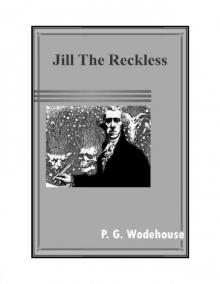 Jill the Reckless
Jill the Reckless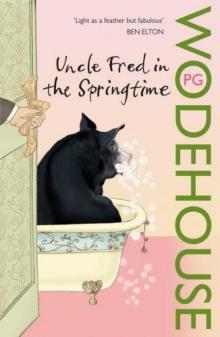 Uncle Fred in the Springtime
Uncle Fred in the Springtime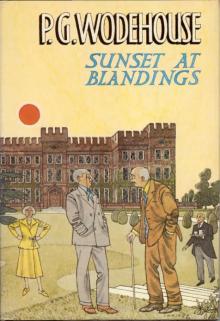 Sunset at Blandings
Sunset at Blandings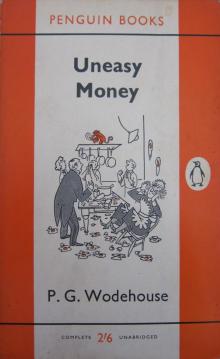 Uneasy Money
Uneasy Money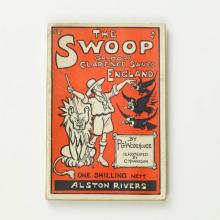 The Swoop! or, How Clarence Saved England: A Tale of the Great Invasion
The Swoop! or, How Clarence Saved England: A Tale of the Great Invasion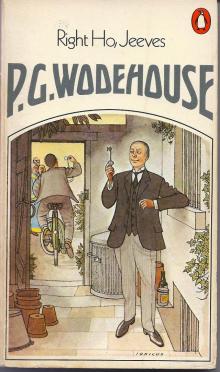 Right Ho, Jeeves
Right Ho, Jeeves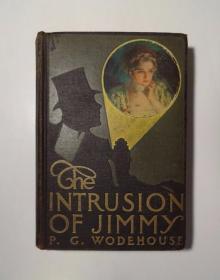 The Intrusion of Jimmy
The Intrusion of Jimmy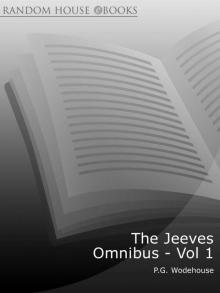 The Jeeves Omnibus - Vol 1:
The Jeeves Omnibus - Vol 1: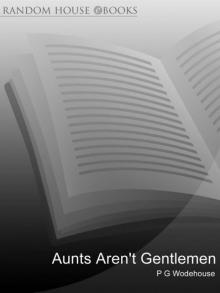 Aunts Aren't Gentlemen:
Aunts Aren't Gentlemen: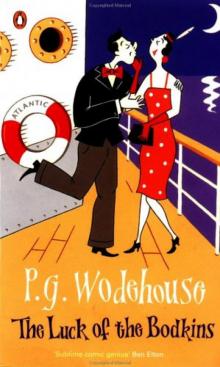 The Luck of the Bodkins
The Luck of the Bodkins The Little Nugget
The Little Nugget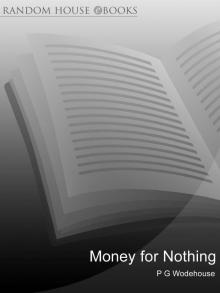 Money for Nothing
Money for Nothing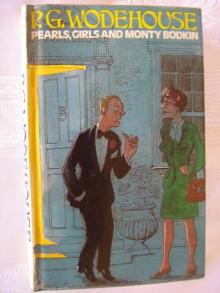 Pearls, Girls and Monty Bodkin
Pearls, Girls and Monty Bodkin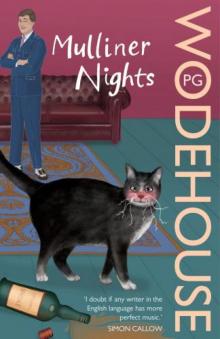 Mulliner Nights
Mulliner Nights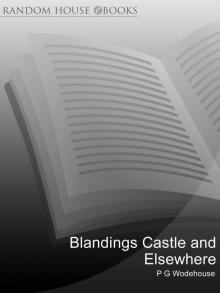 Blandings Castle and Elsewhere
Blandings Castle and Elsewhere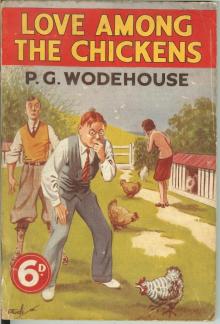 Love Among the Chickens
Love Among the Chickens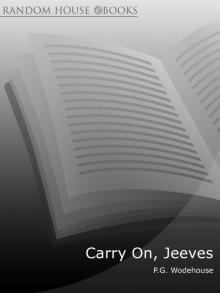 Carry On, Jeeves!
Carry On, Jeeves!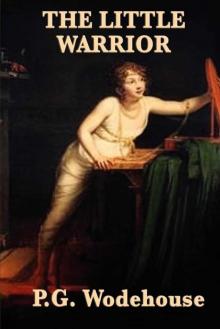 The Little Warrior
The Little Warrior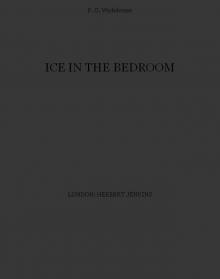 Ice in the Bedroom
Ice in the Bedroom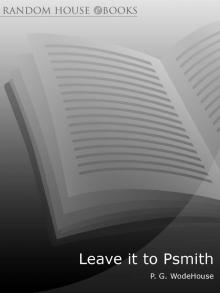 Leave It to Psmith
Leave It to Psmith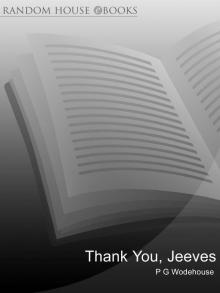 Thank You, Jeeves:
Thank You, Jeeves: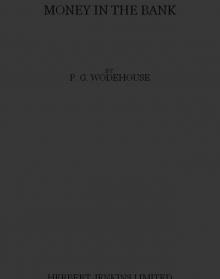 Money in the Bank
Money in the Bank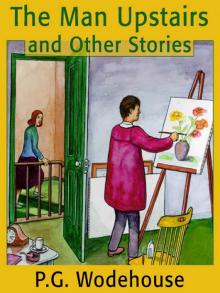 The Man Upstairs and Other Stories
The Man Upstairs and Other Stories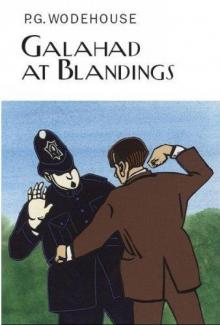 Galahad at Blandings
Galahad at Blandings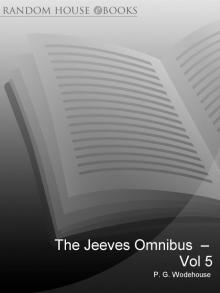 The Jeeves Omnibus Vol. 5
The Jeeves Omnibus Vol. 5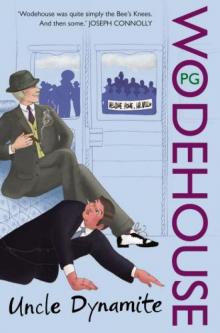 Uncle Dynamite
Uncle Dynamite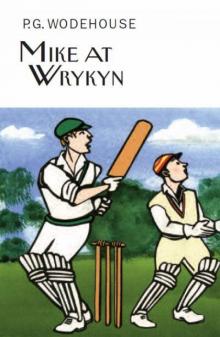 Mike at Wrykyn
Mike at Wrykyn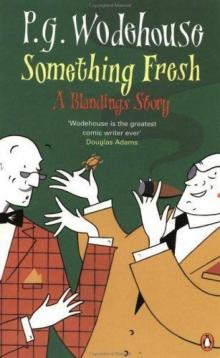 Something Fresh
Something Fresh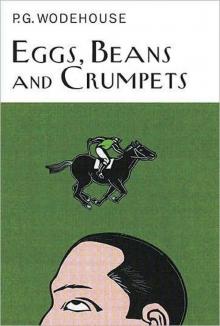 Eggs, Beans and Crumpets
Eggs, Beans and Crumpets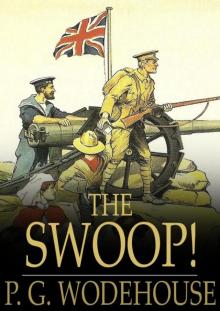 The Swoop: How Clarence Saved England (Forgotten Books)
The Swoop: How Clarence Saved England (Forgotten Books)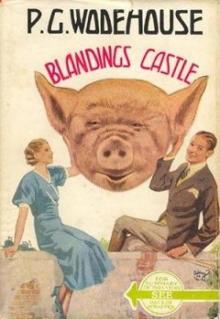 Blanding Castle Omnibus
Blanding Castle Omnibus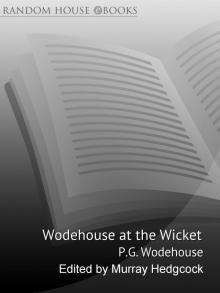 Wodehouse at the Wicket: A Cricketing Anthology
Wodehouse at the Wicket: A Cricketing Anthology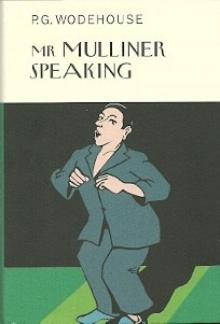 Mr. Mulliner Speaking
Mr. Mulliner Speaking Hot Water
Hot Water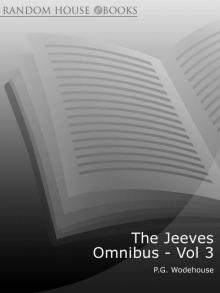 The Jeeves Omnibus - Vol 3: The Mating Season / Ring for Jeeves / Very Good, Jeeves
The Jeeves Omnibus - Vol 3: The Mating Season / Ring for Jeeves / Very Good, Jeeves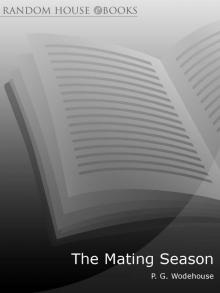 The Mating Season
The Mating Season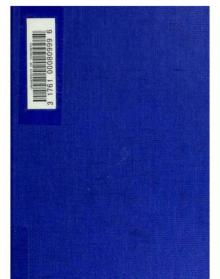 Meet Mr. Mulliner
Meet Mr. Mulliner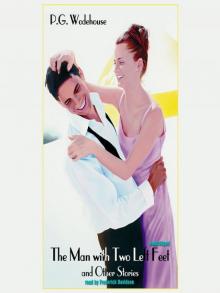 The Man with Two Left Feet, and Other Stories
The Man with Two Left Feet, and Other Stories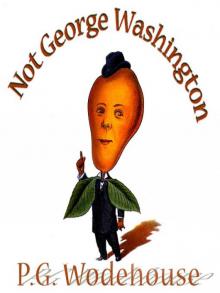 Not George Washington — an Autobiographical Novel
Not George Washington — an Autobiographical Novel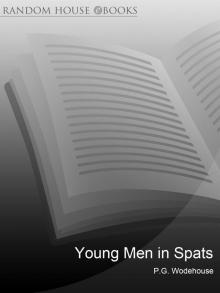 Young Men in Spats
Young Men in Spats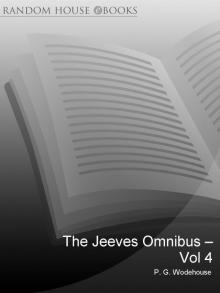 The Jeeves Omnibus Vol. 4
The Jeeves Omnibus Vol. 4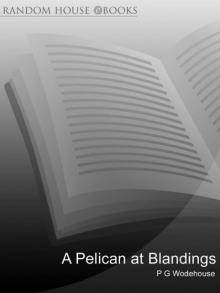 A Pelican at Blandings:
A Pelican at Blandings: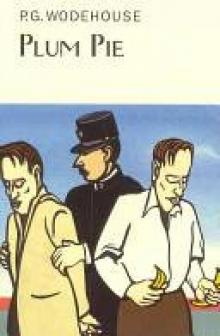 Plum Pie
Plum Pie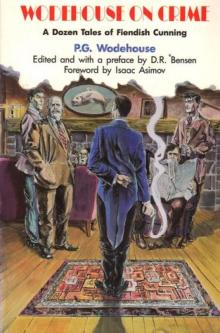 Wodehouse On Crime
Wodehouse On Crime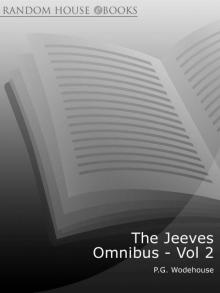 The Jeeves Omnibus Vol. 2: Right Ho, Jeeves / Joy in the Morning / Carry On, Jeeves
The Jeeves Omnibus Vol. 2: Right Ho, Jeeves / Joy in the Morning / Carry On, Jeeves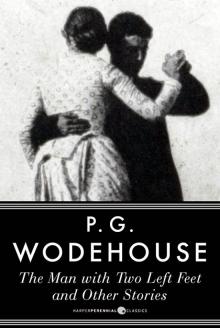 The Man With Two Left Feet
The Man With Two Left Feet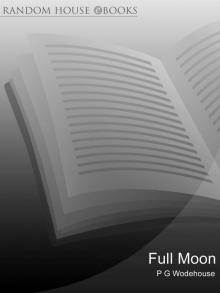 Full Moon:
Full Moon: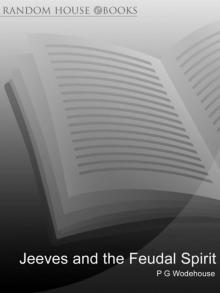 Jeeves and the Feudal Spirit:
Jeeves and the Feudal Spirit: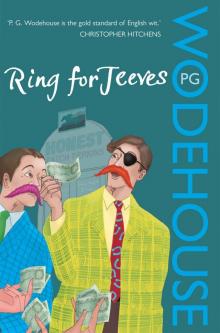 Ring For Jeeves
Ring For Jeeves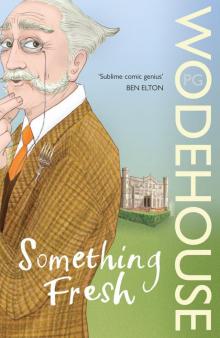 Something New
Something New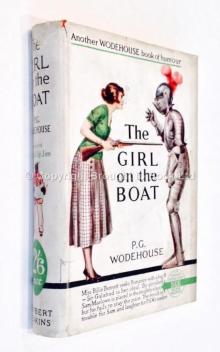 The Girl on the Boat
The Girl on the Boat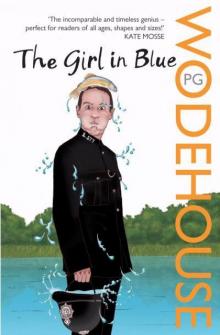 The Girl in Blue
The Girl in Blue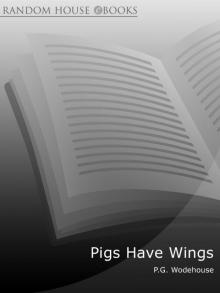 Pigs Have Wings:
Pigs Have Wings: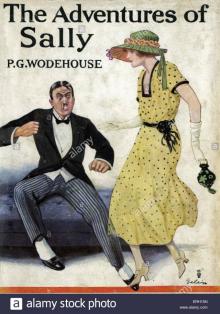 The Adventures of Sally
The Adventures of Sally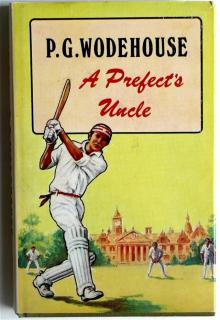 A Prefect's Uncle
A Prefect's Uncle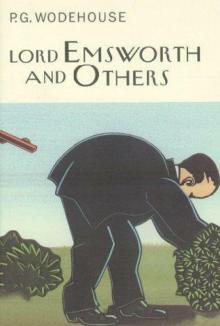 Lord Emsworth and Others
Lord Emsworth and Others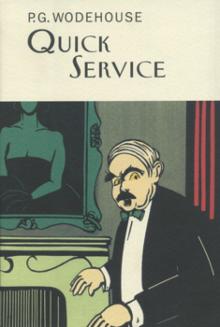 Quick Service
Quick Service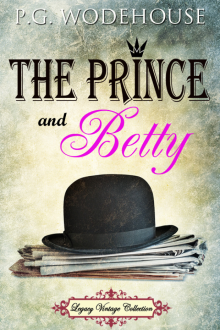 The Prince and Betty
The Prince and Betty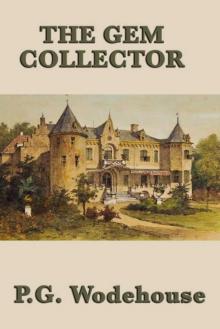 The Gem Collector
The Gem Collector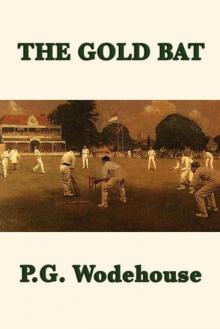 The Gold Bat
The Gold Bat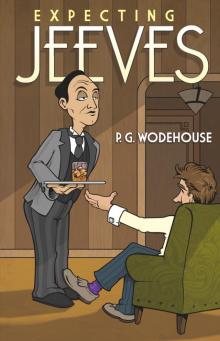 Expecting Jeeves
Expecting Jeeves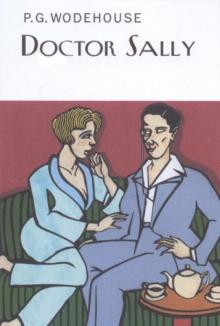 Doctor Sally
Doctor Sally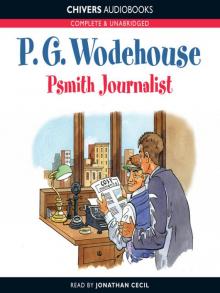 Psmith, Journalist
Psmith, Journalist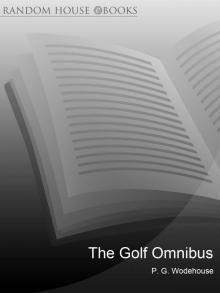 The Golf Omnibus
The Golf Omnibus Heavy Weather
Heavy Weather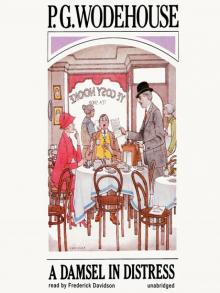 A Damsel in Distress
A Damsel in Distress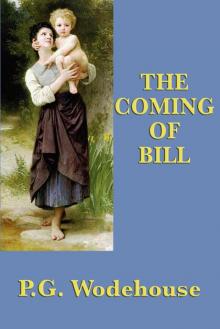 The Coming of Bill
The Coming of Bill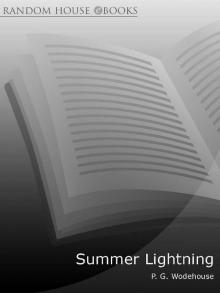 Summer Lightning
Summer Lightning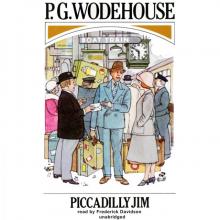 Piccadilly Jim
Piccadilly Jim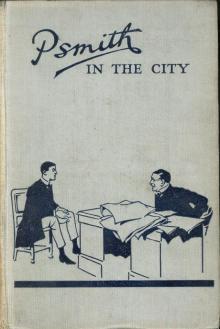 Psmith in the City
Psmith in the City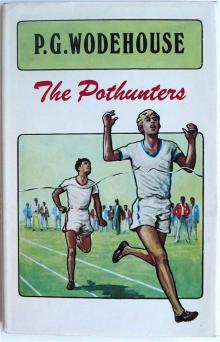 The Pothunters
The Pothunters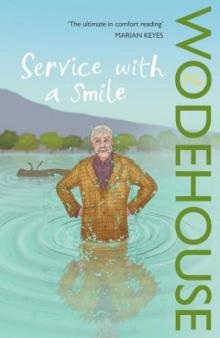 Service With a Smile
Service With a Smile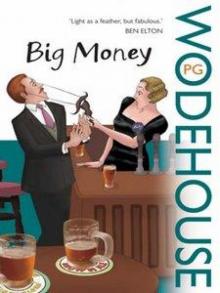 Big Money
Big Money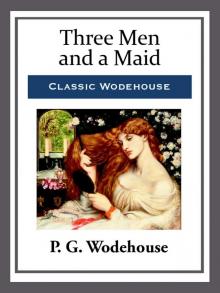 Three Men and a Maid
Three Men and a Maid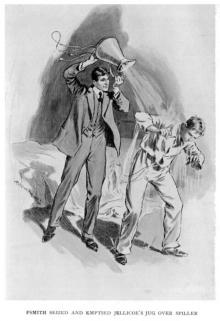 Mike and Psmith
Mike and Psmith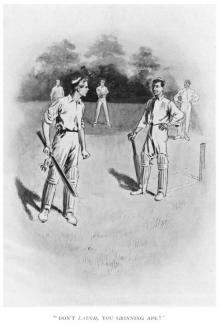 Mike
Mike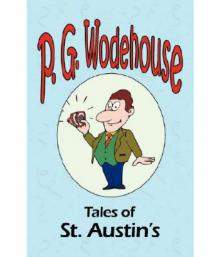 Tales of St. Austin's
Tales of St. Austin's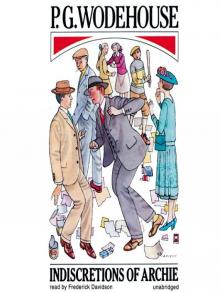 Indiscretions of Archie
Indiscretions of Archie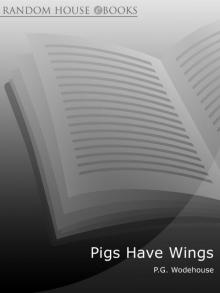 Pigs Have Wings
Pigs Have Wings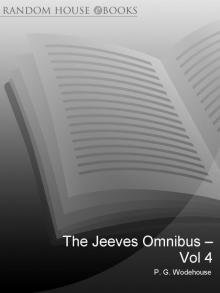 The Jeeves Omnibus - Vol 4: (Jeeves & Wooster): No.4
The Jeeves Omnibus - Vol 4: (Jeeves & Wooster): No.4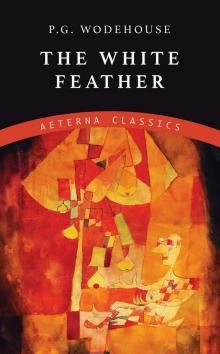 The White Feather
The White Feather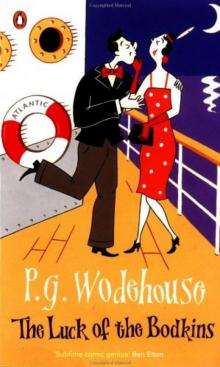 Luck of the Bodkins
Luck of the Bodkins THE SPRING SUIT
THE SPRING SUIT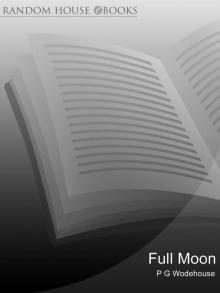 Full Moon
Full Moon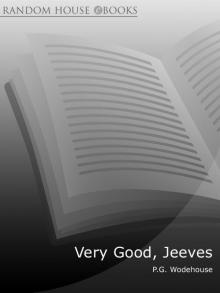 Very Good, Jeeves
Very Good, Jeeves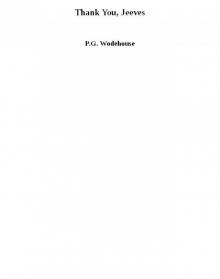 Thank You, Jeeves
Thank You, Jeeves Reginald's Record Knock.
Reginald's Record Knock.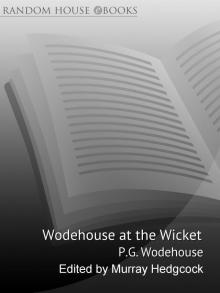 Wodehouse At the Wicket
Wodehouse At the Wicket LADIES AND GENTLEMEN V. PLAYERS
LADIES AND GENTLEMEN V. PLAYERS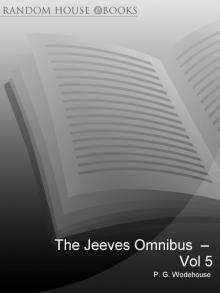 The Jeeves Omnibus - Vol 5: (Jeeves & Wooster)
The Jeeves Omnibus - Vol 5: (Jeeves & Wooster)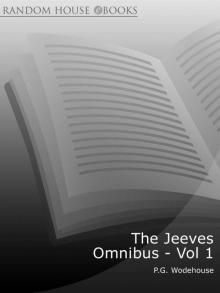 The Jeeves Omnibus - Vol 1: (Jeeves & Wooster): No.1
The Jeeves Omnibus - Vol 1: (Jeeves & Wooster): No.1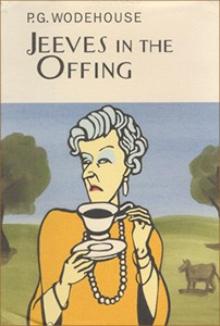 Jeeves in the offing jaw-12
Jeeves in the offing jaw-12